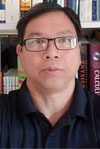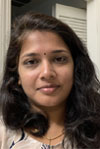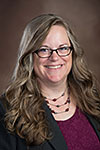UHV graduate students find time for new skills, publish research
University of Houston-Victoria graduate students Vu Pham and Pavithra Sivashanmugam come from different computer science backgrounds but had a similar goal while working from home during the pandemic: enhance their skills and learn more about their respective fields.
“When you love something, you will find a way to make time for it,” Pham said. “For me, sometimes that means working on a solution or studying late until I find a result, or at least see some good results before going to bed.”
Pham and Sivashanmugam, both Katy residents, are working toward Master of Science in computer science degrees at UHV. The two students started in the program last year at the height of the pandemic.
Pham has worked in the computer field for about 20 years. He has a bachelor’s degree in physics from Vietnam National University Ho Chi Minh City and a professional certificate in artificial intelligence from Stanford University. He also holds several certificates and licenses in subjects including applied data science with Python, Google Cloud, deep learning specialization, and image and video processing.
He first started in computer networking and learned about operating systems to better understand computers and work with system parameters. From there, he expanded his knowledge and learned Google languages, Java and more. It led him to his career as a software engineer for the past 15 years. He currently works in the Houston area as an analyst and programmer.
Pham has been working from home since the pandemic started and found himself with extra time. Before the pandemic, he would travel three hours to work and back each day. With that extra time back, Pham wanted to do something that would be helpful in his career and decided last fall to enroll in a graduate program while working full time. He chose UHV because the university’s instructional site in Katy would be nearby.
“I thought, ‘What can I do with this extra time that would benefit my career and my life?’” he said. “I thought going back to school and getting my master’s degree would have two benefits. The first, it’s good for my resume, and second, a professor could help me fill any holes in my knowledge.”
For Sivashanmugam, her career in computer science started on the hardware side as an electronics engineer.
She has a bachelor’s degree in electronics from Anna University in India. Her interest in computer software started while she was a student in college. She started learning about how computer hardware and software work together and started learning computer languages such as C++ and Java on her own. She soon started working as a student on the university campus on a support team. During that time, information technology was becoming a job in each and every field, she said. Sivashanmugam and her friends developed a simple web development application to help schools order uniforms.
She soon progressed to working in programming for companies including Hewlett-Packard and Telecom Solutions. After a decade of working in programming, she moved to Houston a couple of years ago and decided to pursue graduate school full time. She enrolled in the UHV graduate computer science program and now volunteers her time giving advice to family members with website challenges such as automation and project tracking.
Her goal after she graduates from the program is to pursue a job in data science, web development or programming.
“I did not come from a computer science background, so a master’s degree would enhance my knowledge,” she said. “Now I came to know more about cybersecurity, data science and networking, so this degree has helped give me in-depth knowledge to grow in my career or even change my career path.”
The two students were also able to use their experience and what they’ve learned in the program when Hardik Gohel, a UHV assistant professor of computer science, presented them with an opportunity to conduct research and testing for an academic research article titled “Automated predictive analytics tool for rainfall forecasting.”
The article included research about predicting rainfall using artificial intelligence and was written by a team including Pham, Sivashanmugam, Gohel, and Yun Wan, chair of the UHV computer science program and professor of computer information systems.
Since both students had already taken data science and machine learning courses, they conducted research regarding how machine learning and programming tools could be used to develop artificial intelligence that would be beneficial for environmental research, he said. For the article, the group researched and tested algorithms that could help for rainfall prediction.
“There is a need to do significant research in environmental science and engineering through artificial intelligence,” Gohel said. “Although this paper is about rainfall prediction, the same models could be used for hurricane forecasting and other weather forecasting. This type of environmental research and tools could be beneficial for so many entities, from individual meteorologists and organizations to governments. Computer science graduate students have learned actual industry-level applied research experience through this research paper, and this will help our graduate students to achieve competitive career goals.”
Pham has been working with machine learning for the past few years, so when the opportunity to work with machine learning techniques for research came up, Pham was excited to apply his knowledge and experience. For the research article, Pham mainly worked on machine learning development and ran experiments with algorithms to make sure the algorithms were working as best as possible.
“I think this research is good because of the environmental factors and because I was able to apply all the knowledge we’ve learned in our courses and my background,” he said. “There are certain things that happen in real life and not in the classroom, so doing more research to find solutions was a great experience for us.”
Sivashanmugam worked on testing algorithms for the research. What she liked about working on the research article was the reinforcement of her knowledge and skills it provided for her. Along with learning in her courses, the work for the research project helped cement the new knowledge, she said.
The research article recently was printed in Scientific Reports, an open access journal published by Nature journal. Scientific Reports is the sixth most cited journal in the world, according to the journal’s website. This is the first time both students have had research published.
“We are proud to highlight the fantastic work our students and faculty are doing in their research endeavors,” said Joann Olson, associate provost for research and dean of graduate studies. “As Dr. Gohel said, this particular study has wide-ranging implications, and publishing in a high-impact journal like Scientific Reports will multiply the influence of this work.”
The two students and faculty members will present their research during a new series next month called UHV Discovers, a platform for UHV faculty to present their research.
“I was so happy when I found out that all our hard work and effort was published,” Sivashanmugam said. “I’ve learned so much by being a part of this team. It is so helpful to do more than just school courses. You never know how much more you will gain by doing more research.”
The University of Houston-Victoria, located in the heart of the Coastal Bend region since 1973 in Victoria, Texas, offers courses leading to more than 80 academic programs in the schools of Arts & Sciences; Business Administration; and Education, Health Professions & Human Development. UHV provides face-to-face classes at its Victoria campus, as well as an instructional site in Katy, Texas, and online classes that students can take from anywhere. UHV supports the American Association of State Colleges and Universities Opportunities for All initiative to increase awareness about state colleges and universities and the important role they have in providing a high-quality and accessible education to an increasingly diverse student population, as well as contributing to regional and state economic development.
Amber Aldaco
361-570-4296








